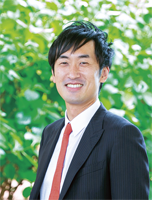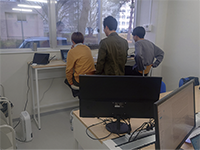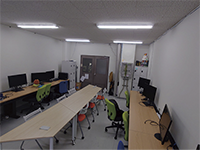8
Applied Waveoptics Laboratory
Professor / ONO Hiroshi
Associate Professor / SAKAMOTO Moritsugu
Technical Staff / NODA Kohei
- Advanced lightwave control devices using functional optical materials.
- Sample preparation, optical experiments, and theoretical analysis (consistently).
- Technologies centered on electromagnetic wave and lightwave engineering.

Professor / ONO Hiroshi, Associate Professor / SAKAMOTO Moritsugu
Prof. Ono has research experience at a company and provides practical guidance. Assoc. Prof. Sakamoto gives us detailed guidance on our research. Asst. Prof. Suzuki is very easy to talk to because of his close age, and he is available for various consultations. In addition, the professors carefully teach us how to proceed with our research.
Research Content
Electromagnetic wave and lightwave control technologies are fundamental technologies that support our lives, such as optical information processing in optical communications and measurements/tests in factories. Our laboratory mainly studies lightwave control using functional optical materials such as liquid crystals. Specific examples include research on polarization imaging using liquid crystal diffraction gratings and research on nano-order fine processing using special lightwave called optical vortices. We are also engaged in many other studies on electromagnetic waves and lightwaves.This laboratory is the best for everyone who want to study lightwaves, or who like physics (including electromagnetics) or chemistry.

Experimenting with optical tweezers
A Day in the Lab
We can basically research at our own pace. Contents of research activities vary from day to day, and we do sample preparation, optical experiments, and theoretical analysis. The seminar is held once a week, where students report and discuss the results obtained, introduce papers on optics/photonics, and practice presentations at conferences. Through daily research activities and weekly seminars, we can learn the technological knowledge, logical thinking, and presentation skills required for R&D. You may get stuck in the course of your research, but I believe you will be able to get over it because there are reassuring staffs and colleagues.

The laboratory life
Thesis Subjects
- (M)Study on Geometric Phase Diffractive Optical Elements for Diversification of Beam Steering
- (M)Effect of different measurement wavelengths on Polarization-probe polarization-imaging system
The number of
PhD Graduates
6
Major employers of Graduates
- Texas Instruments Japan Ltd.
- NICHIA Corp.
- Hamamatsu Photonics K.K.
- FUJITSU COMPONENT Ltd.
- HAYASHI TELEMPU Corp.
- Shin-Etsu Chemical Co., Ltd.
- NIPPON SEIKI Co., Ltd.
- NIPPON CHEMI-CON Corp.
- Sony Digital Network Applications, Inc.
- Bosch Corp.














